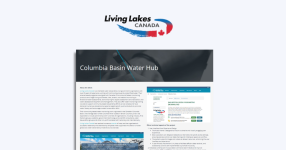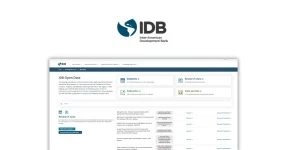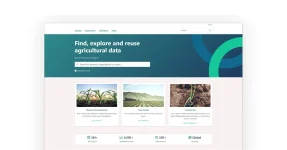It is a cliché to say that any year is more important than another in the life of a company. The last twelve months have been busy for Link Digital, with new staff, new projects, and the opening of a new office. This is business as usual since the company was founded as Link Web Services at the end of the dot-com bubble in 2001 and renamed Link Digital in 2004. What we can say, however, is that 2023 has seen a significant development in our work as a digital agency operating at the intersection of open data and open source technology.
This is not just about what Link Digital has done. It is about the events we have organised and taken part in, and the networks, and communities we continue to work with in Australia and internationally. Here are six things that we think made 2023 a particularly exciting and noteworthy year.
Our work for clients
At the heart of Link Digital, our commitment is to provide high-quality tailored solutions to meet the needs of clients. Over the last twelve months, we have been privileged to be involved in a diverse range of projects using open source, open data solutions to make meaningful change. This has included ongoing work with New Zealand’s Ministry of Business, Innovation and Employment, and the development of open data portals for Living Lakes Canada, a community-based organisation that undertakes a diverse range of water monitoring activities in the Columbia Water Basin, in the western Canadian province of British Columbia. and Keck Medicine at the University of Southern California. The latter also included the provision of a training and support program to ensure the smooth establishment and running of the portal.
We have continued to do a considerable amount of work for the New South Wales Government. Among these were two projects for the Department of Planning, Industry and Environment, one of which involved a complete redesign and upgrade of the Department’s Sharing and Enabling Environmental Data portal, which brings together state-wide data on land, water and air, and plant and animal life. Link Digital finalised an extension of the Sydney Botanic Garden’s site, a searchable what’s on guide for activities in the gardens, which includes a global map feature. And we worked on a soon to go live website for the new Vehicle Emissions Star Rating, an NSW program that has been endorsed by the Commonwealth Government and all states and territories.
Link Digital also built internal data portals, for the sharing of data within organisations, for the global medical NGO Médecins Sans Frontières/Doctors Without Borders, and the NSW Data Analytics Centre. The Centre is a first-of-its-kind body in Australia with the mission of building a world-class whole-of-state government data analytics operation to improve police design and service provision, ensure correct stewardship of the state’s data assets, and support the increased adoption of data-informed practices. The portal will streamline the secure sharing of non-public data by public servants at the state and local levels.
A growing presence in Canada
Link Digital established a subsidiary company in Canada in 2023 and followed this up by a busy schedule of in-country activity. In September, our Chairman Steven De Costa and CEO Marc Evans visited Canada, where De Costa was the keynote speaker at an event in Toronto co-hosted with the Canadian Open Data Society. This brought together participants from government, business and not-for-profit sectors to learn what governments in Australia and Canada are doing in the open data and data-sharing space, what the benefits have been, and how quality open data can be used to build public trust in government. De Costa was back in Canada in November to give the keynote at the Canadian Open Data Summit on ‘The Architecture of Trust: Open and Honest Data’.
Link Digital has been thrilled by the welcome extended to us from the Canadian open data community, and how our values, approach and expertise have resonated with those of our Canadian colleagues. Excitingly, we finished the year by formalising official partnership agreements with two key players in the Canadian open data space, the Montreal-based data governance and digital strategy agency, Open North, and Living Lakes Canada. These partnerships not only foreshadow further geographical expansion in terms of project possibilities open to us but the value and skills that we will be able to bring to future clients.
The continuing growth of CKAN
The Comprehensive Knowledge Archive Network (CKAN) is a powerful ‘out of the box’ piece of open source software that can become an open data platform. Link Digital has provided CKAN-based open data platform services for over ten years, is a proud CKAN co-steward, and engages closely with its large and expanding user base. Over the last twelve months, Link Digital has worked with this community on the next version of the software, CKAN 3.0, which should be ready for release in the first half of 2024. The new version will include several modernisations to CKAN’s tech stack, with the aim of making it more interactive, and improving search functionality and user interface for data consumers.
This year has also seen powerful validation of CKAN’s significant impact. As part of the development of CKAN 3.0, the National Science Foundation in the United States has undertaken the Pathways to Enable Open-Source Ecosystems or POSE project. This focused on how the CKAN’s effectiveness as an open data platform could be strengthened, and the steps necessary to adequately support CKAN’s maintenance and ensure the needs of all users are integrated into technical modifications going forward. The POSE Project found strong evidence of CKAN’s wide adoption. It identified nearly 400 regularly updated CKAN data portals of different sizes in 59 countries, spread across six major continents, with Brazil and the United States having the largest prevalence, followed by Argentina, Australia, Canada, Germany, the UK, Spain, Italy, and Japan.
Importantly, from the point of view of building the open data community, POSE identified that CKAN is used not only by large and sophisticated digital teams behind platforms such as The United States Open Data Portal (over 250,000 data sets) and Open Africa (the largest repository of data on the African continent) but also individuals with little resources and technical training.
The real-world benefits of open source technology such as CKAN were also recognised by the decision of the Digital Public Goods Alliance in mid-2023 to award it the status of being a Digital Public Good (DPG). This was a recognition of CKAN’s value as a driver of positive change in helping to attain many of the Sustainable Development Goals put forward by the United Nations (UN), and its use by multilateral organisations like the UN Refugee Agency, the United Nations Office for the Coordination of Humanitarian Affairs, as well as philanthropic organisations and by grassroots civil society movements.
The evolution of the open data movement
Link Digital has been championing the benefits of making data open, including improved government decision-making and service provision and facilitating a more informed and involved citizenry, since 2012. But as the open data ecosystem continues to grow and evolve, we are keen to position ourselves to add value to the new ways that open data is being utilised: in corporate environmental, social, and corporate governance; in innovative ways of working for government and public servants; in building trust in public institutions and combating malicious large-scale disinformation campaigns; and in providing better quality data to help build models of artificial intelligence that are more trustworthy, safer, diverse and socially beneficial.
Many of these future directions were crystalised for Link Digital during our participation in the 2023 Open Government Partnership (OGP) Summit in Tallinn, Estonia, in September. A movement of national and local governments and civil society groups to further the aim of open government, the focus of the 2023 OGP summit was on open government in the digital age and the potential for policy making to be more open and transparent and, thus, strengthen democracy. The role of open source software such as CKAN and the community around it was front and centre of a day-long side event at Tallinn, ‘The Tech we want to open governments,’ sponsored by Link Digital and hosted by Open Knowledge Estonia and Open Knowledge Finland. This discussed the future of government transparency and the role of civil society in helping to achieve it, and the digital technology solutions available to maximise the possibilities of the OGP and its support of open government.
Building the open data community
Link Digital’s role in the open data ecosystem is not just about data as a driver of economic value. We also want to continue to help build and strengthen the community of like-minded people interested in the importance of open data and stay up to date with the latest developments in the field. As part of this, this year Link Digital kicked off a series of free monthly online forums. Speakers so far have included Maggie Finkle-Aucoin from Living Lakes Canada on the award-winning Columbia Basin Water Hub project, Jaimie Boyd, National Digital Government Leader at Deloitte Canada, on the government’s use of open data in Canada, and Pia Andrews on Australia’s “Public Servant Revolution”.
Link Digital has been an active participant in consultations around the formulation of Australia’s third National Action Plan, as required as part of the country’s OGP membership. We have also been involved in the Australian government’s draft Data and Digital Government Strategy, which sets out the vision for using data and digital capabilities to deliver simpler, more secure public services and for building a more digitally enabled public service.
Policy-to-Practice Accelerator Program
While attending the Canadian Open Data Summit in November, De Costa held an Executive Briefing on a new Policy-to-Practice Accelerator Program tailored for government teams, that will enter a discovery phase to be facilitated by Link Digital and Open North in early 2024.
The Program is aimed at assisting government staff and agencies to explore more adaptive policy management alongside the principles of open knowledge. It will offer practical resources, training, and digital mentorship on the use of open data and the innovative work practices that can flow from it. We hope that the Program will help foster more responsive and effective government policies to address the needs of our rapidly evolving society.
The Program is very much a response to the debates occurring in Australia and in global forums such as the OGP around the role that open data can play in enhancing government openness and public participation. At the Tallinn Summit mentioned earlier, the OGP launched an ambitious five-year strategy called the Open Government Challenge, to increase commitments by government and civil society members to address themes like anti-corruption, digital governance, and the protection of civic space. We hope as the Policy-to-Practice Accelerator Program develops it will evolve into something that can be co-created by a diverse range of international stakeholders, thus ensuring its alignment with the principles of the OGP and the CKAN community.
The Policy-to-Practice Accelerator Program is just one of many activities that Link Digital is looking forward to in 2024. But that’s next year. Right now, we hope you enjoy your end of year celebrations and will take great comfort and joy from whatever traditions you observe.
See you in 2024!



